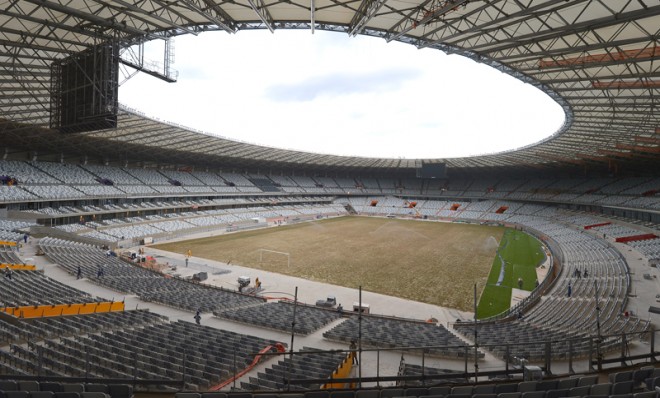Why soccer-loving Brazilians are souring on their national pastime
World Cup stadium construction and renovations have cost three times as much as originally projected


A free daily email with the biggest news stories of the day – and the best features from TheWeek.com
You are now subscribed
Your newsletter sign-up was successful
In soccer-loving Brazil, even the national pastime hasn't been immune to the enormous protests unfolding around the country.
Brazil will host the 2014 World Cup, and began work several years ago to renovate seven stadiums and build five more to accommodate the tournament. Since then, construction costs have run well over budget, putting major development and public works projects on hold and giving protesters, already upset with a range of governmental policies, yet another grievance to demonstrate against.
When bidding for the World Cup in 2007, Brazil estimated that stadium construction projects would cost around $1 billion all told. That figure has since tripled to $3.68 billion.
The Week
Escape your echo chamber. Get the facts behind the news, plus analysis from multiple perspectives.

Sign up for The Week's Free Newsletters
From our morning news briefing to a weekly Good News Newsletter, get the best of The Week delivered directly to your inbox.
From our morning news briefing to a weekly Good News Newsletter, get the best of The Week delivered directly to your inbox.
South Africa, which hosted the last World Cup, spent about $1.5 billion on all its stadiums.
Renovations to the aging Mane Garrincha National Stadium in Brasilia — the largest stadium project in Brazil's history — have cost $750 million alone. Some 200 protesters, furious over the juxtaposition of the stadium's ballooning cost to the nation's economic woes, burned tires and blocked roads outside that stadium earlier this month.
Brazilian officials initially said the construction costs would be largely covered with private money. However, estimates now show that public funds will cover roughly 90 percent of the total costs, according to Bloomberg.
Despite their high price tags, some of the facilities will face a daunting challenge in attracting spectators once the tournament ends, meaning it will likely be difficult to recoup these investments. Already, some stadiums are projected to become "white elephants" — huge drains on public finances that don't deliver the promised economic return. That's the same fate that befell some of South Africa's stadiums, which were erected for the World Cup but have sat largely unused since.
A free daily email with the biggest news stories of the day – and the best features from TheWeek.com
At least four of Brazil's stadiums — and possibly as many as eight — will never be profitable, according to Reuters.
In one city, Cuiaba, the government is spending some $285 million to build a new stadium that will host just four World Cup games. Volatile weather and extreme seclusion could keep the nearly $300 million stadium being built in the city of Manaus from becoming an enduring attraction, as Jonathan Watts noted in the Guardian.
Located in one of the planet's last great wildernesses, Manaus is doubly isolated: first by the confluence of the Rio Negro and Rio Solimões, then by a sea of green forest that stretches close to 600 miles on all sides. The electric storms that buffet Manaus sometimes overload the local grid and burn out computers, air conditioners and fridges. Rainy-season downpours can turn a building site into a swimming pool. The equatorial sunlight is so intense that it can bleach coloured plastic seating." [Guardian]
Other new stadiums with similar price tags have been built in cities where the local teams, far removed form the top-tier of national competition, draw hundreds, not thousands, of fans per game.
That's all to say nothing of the other high costs associated with hosting a sprawling event like the World Cup. The government has allocated $900 million for security, and another $12 million for infrastructure improvements needed to accommodate the increased travel and lodging around the games.
The skyrocketing costs have been attributed to a few possible factors. Projected spending on World Cups — and on other international events like the Olympics, for that matter — are often way off base. A stadium in Johannesburg, South Africa, that hosted the final World Cup game in 2010, went $133 million over budget.
There's also the issue of rampant corruption in Brazil (it's one of the reasons protesters took to the streets in the first place), which could be further exacerbating the problem.
One protester neatly summed up the general opposition to the stadium financing, telling the Guardian "football is all about money."
"The World Cup contributes nothing to society," that protester added. "It's just for the elite."
Jon Terbush is an associate editor at TheWeek.com covering politics, sports, and other things he finds interesting. He has previously written for Talking Points Memo, Raw Story, and Business Insider.
-
 Is Andrew’s arrest the end for the monarchy?
Is Andrew’s arrest the end for the monarchy?Today's Big Question The King has distanced the Royal Family from his disgraced brother but a ‘fit of revolutionary disgust’ could still wipe them out
-
 Quiz of The Week: 14 – 20 February
Quiz of The Week: 14 – 20 FebruaryQuiz Have you been paying attention to The Week’s news?
-
 The Week Unwrapped: Do the Freemasons have too much sway in the police force?
The Week Unwrapped: Do the Freemasons have too much sway in the police force?Podcast Plus, what does the growing popularity of prediction markets mean for the future? And why are UK film and TV workers struggling?
